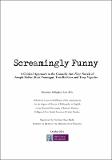| dc.contributor.advisor | Ryder, Sean | |
| dc.contributor.author | Gallagher, Rosemary | |
| dc.date.accessioned | 2017-05-11T15:28:14Z | |
| dc.date.issued | 2016-10-14 | |
| dc.identifier.uri | http://hdl.handle.net/10379/6513 | |
| dc.description.abstract | This thesis investigates the use of humour in American anti-war novels in the second half of the twentieth century, through an analysis of joke-work in Joseph Heller’s Catch-22 (1961), Kurt Vonnegut’s Slaughterhouse-Five (1969), Tom Robbins’ Villa Incognito (2003) and Tony Vigorito’s Just a Couple of Days (2001). Though the earlier novels have been referred to as “Black Humor”, work done by critics of this genre in the 1960s and 1970s over-emphasised the “black” and failed to account for the “humour”. With recourse to Freud’s work on humour as well as Jerry Palmer’s The Logic of the Absurd (1987) the joke-work in these novels will be examined in depth, as well as the changes in comic technique from the earlier to the later examples. In consideration of the psychological release afforded by laughter, as described in Freud’s comments on humour, the connections between biography and fiction will be examined, particularly with regard to the authors’ own war experience. As the anti-war novelists’ proximity to the traumatic war experience increases and their psychological burden lessens, this thesis will account for the lessening degree of acerbity in humour in the later examples. In short, through an analysis of joke construction this thesis will account for the way in which the comedic anti-war novel becomes less and less absurd throughout the second half of the twentieth century. | en_IE |
| dc.rights | Attribution-NonCommercial-NoDerivs 3.0 Ireland | |
| dc.rights.uri | https://creativecommons.org/licenses/by-nc-nd/3.0/ie/ | |
| dc.subject | Humour Studies | en_IE |
| dc.subject | Joseph Heller | en_IE |
| dc.subject | Kurt Vonnegut | en_IE |
| dc.subject | Tom Robbins | en_IE |
| dc.subject | Tony Vigorito | en_IE |
| dc.subject | English literature | en_IE |
| dc.subject | American literature | en_IE |
| dc.subject | Black humor | en_IE |
| dc.subject | Humor studies | en_IE |
| dc.title | Screamingly funny: A critical approach to the comedic anti-war novels of Joseph Heller, Kurt Vonnegut, Tom Robbins and Tony Vigorito | en_IE |
| dc.type | Thesis | en_IE |
| dc.contributor.funder | College of Arts, Social Sciences and Celtic Studies, NUI, Galway | en_IE |
| dc.local.note | This thesis investigates the use of humour in American anti-war novels in the second half of the twentieth century, through an analysis of joke-work in Joseph Heller’s Catch-22 (1961), Kurt Vonnegut’s Slaughterhouse-Five (1969), Tom Robbins’ Villa Incognito (2003) and Tony Vigorito’s Just a Couple of Days (2001). | en_IE |
| dc.description.embargo | 2021-03-08 | |
| dc.local.final | Yes | en_IE |
| nui.item.downloads | 1033 | |


